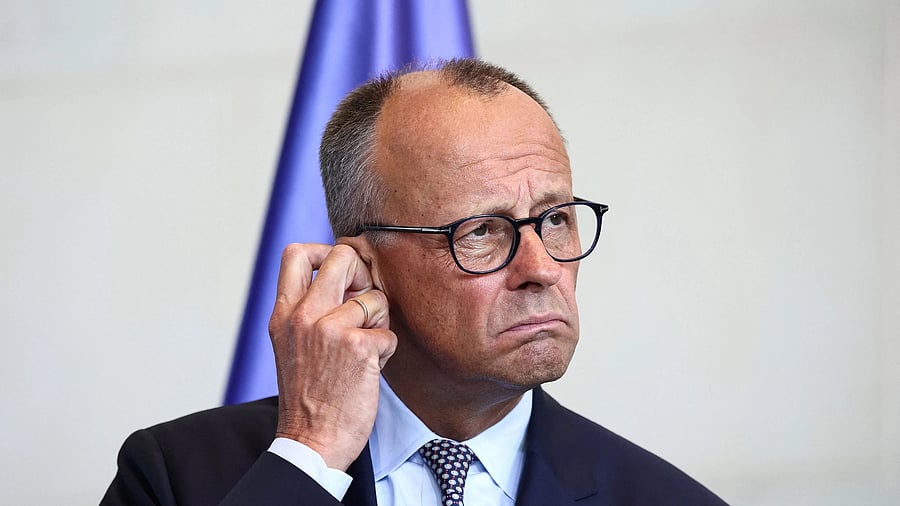
German Chancellor Friedrich Merz
Credit: Reuters photo
German Chancellor Friedrich Merz couldn’t have landed in a spot worse than what he did after taking one of his toughest calls yet for a partial halt of arms supply to Israel that has been pummelling unarmed residents of Gaza, where 61,500 people, including journalists and aid workers, have died so far.
Merz had on August 8 pulled the plug on the supply of some crucial weapon systems that Israel has been allegedly using to kill Gazans in the ongoing war on a people stacked against heavy odds. But Merz came in for fire from his conservative Christian Democratic Union (CDU) and its sister party Christian Social Union, after his surprise decision considering Germany’s long-standing cooperation with Israel.
The Chancellor reportedly took Lars Klingbeil, his Vice Chancellor of his centre-
Left coalition partner Social Democratic Party, into confidence before taking the landmark decision. The Chancellor’s party colleagues alleged that he failed to consult them before taking such a major decision.
German newspaper FAZ on August 10 reported that several CDU leaders were “stunned, angry and horrified,” while CDU MP Roderich Kiesewetter commented on X that Merz’s decision is “a serious political and strategic mistake on Germany’s part.”
Many leaders alleged that the decision was influenced by anti-Semites since Germany has always supported Israel in every possible way since World War II. Successive German governments had earnestly provided military and other aid to Israel as a reparation for the state-sponsored genocide by the Nazi regime of Adolf Hitler that killed around six million Jews.
Germany is a country where the denial of the Holocaust is a punishable offence. But anti-Semitism has sprung into national concern with the surge of the far-right Alternative for Deutschland (AfD), the second largest party in the German Bundestag.
Member of European Parliament Dennis Radtke of the CDU warned on X against allowing “foreign policy decisions to be influenced by the anti-Semitic mob on our streets.” But an unfazed Merz told state broadcaster ARD: “I did not make this decision alone, but at the end of the day, it is a decision for which I alone must take responsibility. Israeli Prime Minister Benjamin Netanyahu called Merz to tell him that his goal was to free Gaza from Hamas and not to take it over.
Germany comes second only to the US in supplying weapons to Israel and is among the countries that decried the Hamas-led attack on Israel on October 7, 2023. Heavily armed Hamas militants had killed more than 1,200 Israelis and taken over 250 hostages, many of whom died in captivity, and some were released.
Shifting public opinion
While Germany was among the countries that quickly affirmed Israel’s right to self-defence and continued supplying arms, the global public opinion had drastically changed after innocent civilians, including children, were targeted in Gaza. Multiple protests had broken out in Europe, especially Germany, leaving the authorities
to address a rising sentiment against the killings that many interpreted as genocide, going by the pattern in which the Israeli Defence Forces targeted hospitals and civilian habitats, claiming Hamas used civilians as human shields.
But Germany, along with the US and Italy, continued supplying deadly weapons to Israel to bolster its arsenal. According to the Stockholm International Peace Research Institute (SIPRI), Germany supplied over a third of the weapons imported by Israel during 2020-24. This was a steep rise from hardly 6% in 2016-2020. The US, which supplied almost 92% of all weapons sourced by Israel, was down to 66% in 2020-24 when Germany increased its supplies.
Germany’s arms supplies to Israel included armoured vehicles, anti-tank weapons, ammunition, and military trucks. According to media reports, Germany approved $355 million in arms sales to Israel in the first year of the ongoing Gaza war, of which 6% was classified as “offensive” and not to
be used outside Israeli territory. They include armoured vehicles and deadly munitions, which were allegedly used on Gazans.
While Israel itself is a major arms manufacturer, the steady flow of weapons and their support systems from the US, Germany, and Italy, among other countries, helped the IDF to remain armed to the teeth. Israel is likely to send envoys to Berlin to find a way out of the imbroglio and prevent other arms suppliers from following suit. But it remains to be seen if Merz would dare to lift the embargo that has received much public support.
(The writer is a senior journalist based in Berlin)